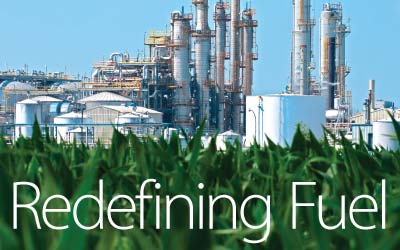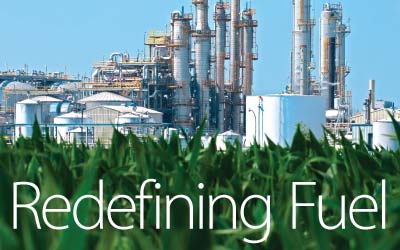
Canada’s newly minted Renewable Fuels Standard is creating opportunities across the country’s business landscape.
A recent report by market research company RNCOS identified the Americas—namely, the United States, Brazil, Argentina and Canada—as global leaders in bioethanol, producing 90 per cent of the world’s supply. The largest segment of this figure is produced in the United States—49 per cent, according to the report—but recent Canadian initiatives signify a growing commitment to bioenergy north of the border.
Last December saw the start of the federal Renewable Fuels Standard, requiring an annual average of five per cent renewable content in gasoline, followed by a required two per cent renewable content in diesel fuel and heating distillate oil, which came into effect in July.
However, province-by-province statistics look somewhat different than the federal mandate would suggest. British Columbia leads provincial biodiesel standards with its requirement that biodiesel comprises four per cent of diesel supplies in 2011 and five per cent in 2012. Manitoba and Saskatchewan boast the highest provincial ethanol standards, with 8.5 and 7.5 per cent renewable material required, respectively. Ontario has no existing biodiesel requirement but requires five per cent ethanol, while the eastern and northern provinces and territories are exempt from the RFS altogether.
According to Dennis Rogoza, an advisor on sustainability and biofuels for the Canola Council of Canada, Ontario and the four western provinces were ahead of the game in terms of infrastructure, and did not wait for the national standards to be implemented before launching their own policies. “This gave each provincial government policy flexibility,” he says. “Ontario and the western provinces first introduced mandates as part of their GHG reduction policies over the past several years. These mandates allowed the federal mandate to proceed more quickly. If these provincial mandates had not been in place then none of the supply infrastructure would have been ready, just as is the case today in the eastern provinces.”
Economic Stability
To many, the RFS signals the beginning of a necessary shift. Tim Haig, interim president for the Canadian Renewable Fuels Association, sees the federal mandate as wholly positive. “A mandate of two per cent biodiesel and five per cent ethanol content in gasoline adds jobs to the economy and stability to commodity prices, and reduces dependence on importing oil,” he says. “The States spends 700 billion on importing oil, and that means there’s a tax on everyone there. You can reduce that tax by producing your own oil.”
A huge benefit of biofuels production at home, according to Haig, is its effect on the markets. “It becomes a natural hedge for variable commodity prices. Having stability in the agribusiness is huge—it’s been subsidized globally for years and years,” he says. “Volatility in prices is good for traders but not producers. Producers need stability, and renewables are a big part of that.”
Rogoza sees biofuels as a major boon to canola producers for the same reasons. “The industry is subject to the vagaries of the international export market. Having domestic markets that are stable is better for the ag industry,” he says.
But beyond the markets, according to Rogoza, there will be plenty of other practical benefits. “The construction of biofuels plants, many of them in small communities, will diversify industry in rural areas and bring high-quality, high-paying jobs,” he explains. “Then there are the environmental benefits—the Renewable Fuels Standard will reduce greenhouse gasses, and on the biodiesel side, the more biodiesel you use, the lower the contaminants coming out of the tailpipe.”
Food for Fuel?
Regardless of increased government support for sustainable energy solutions—Natural Resources Canada aims to invest up to $1.5 billion over nine years in support of biofuel production—the food versus fuel debate continues. The chief arguments against biofuels are that the increase in land use for biofuels crops will contribute to global food insecurity over the long run, and demand for ethanol will increase food prices.
Haig sees the food versus fuel debate as “hypothetical,” and cites petroleum costs as the primary drivers of food prices. “I find it an astounding conversation—I don’t think the increased demand for fuel crops has had any effect on food prices,” he says. And with regard to land use, Haig points out that far from biofuels swallowing up food cropland, there are many untapped resources available in Canada alone. “In Canada there are 2.5 million unplanted hectares,” he says.
The food versus fuel debate spreads beyond Canada’s shores, however. Richard Phillips, executive director of the Grain Growers of Canada, sees the question as a tough one when discussing the implications of biofuels crop production on countries where food can sometimes be in short supply. “In the Third World, if you grow biofuels crops you get good cash for them, but when there’s a drought, they don’t have Sobeys or supermarkets like we are used to; when you go down to the market there are no crops to buy. So there is sensitivity in some Third World countries to pressures to grow biofuels crops,” he explains. “You might get cash for these crops but you can’t eat cash.”
Sustainability Matters
In general terms, however, Phillips finds much to applaud about the fuel standard. He says that increased demand for sustainability as a baseline business practice has contributed to the urgency for biofuels production in Canada. “What producers are looking for is to create as much demand as possible for their crops. Renewable fuels create demand and more price competition,” he says. “As producers, we face pressures from society to use sustainable methods.”
Whether biofuels will impact prices at the pump is not entirely clear, but Phillips says that in Canada, it’s more a question of sustainability than cost. “In Canada, we are already fuel self-sufficient. This is more about environmental sustainability in Canada than it is about impacting fuel prices,” he says. “Biofuels are not the total solution, but they’re part of the solution.
“What’s really key is that biofuels get up and going and are tested so they work correctly. You have to get people using biofuels and testing them, and then you can work out the kinks, and then the next generation after that is better. But consumer acceptance has to happen at the same time,” he says.
Julienne Isaacs











